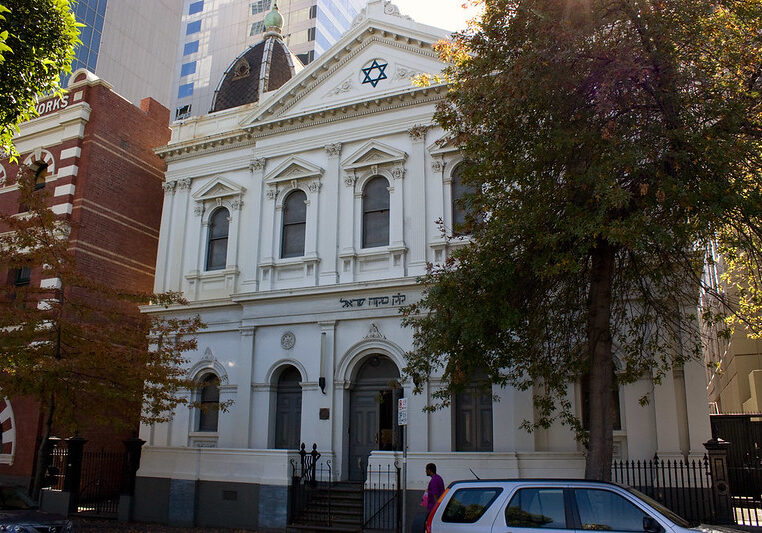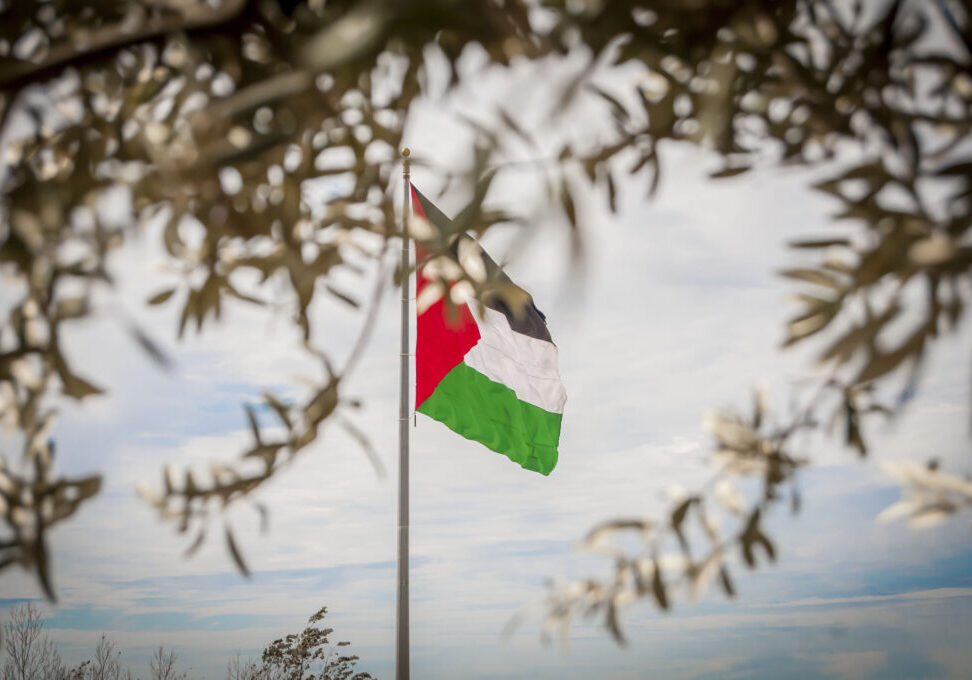Australia/Israel Review
Noted and Quoted – February 2019
Feb 6, 2019 | AIJAC staff

Eye-watering claims
Pontificating on the relationship between Israel and the Trump Administration, former Australian foreign minister Bob Carr opined, “US diplomacy in the Middle East is bound with hoops of iron to the most chauvinist advocates of a greater Israel. Not an onion skin separates the White House from Israeli Prime Minister Benjamin Netanyahu. When the time comes, for example, it’s hard to see the administration resisting annexation of the West Bank,” Australian (Dec. 29).
Carr’s claim was badly ill-informed.
In August 2018, US President Donald Trump explained how US recognition of Jerusalem as Israel’s capital fitted into his world view, saying, “In the negotiation, Israel will have to pay a higher price, because they won a very big thing…[The Palestinians]…will get something very good, because it’s their turn next. Let’s see what happens.”
Earlier, speaking directly to Netanyahu, Trump said “You won one point, and you’ll give up some other points later on in the negotiation – if it ever takes place.”
The Trump Administration has spent the past year developing a plan that it believes will demarcate a workable two-state formula for peace between Israel and the Palestinians. Its key Middle East envoys issued a statement that “No one will be fully pleased with our proposal, but that’s the way it must be if real peace is to be achieved… Peace can only succeed if it is based on realities.”
Hardly the words of an Administration that is going to happily accept Israeli annexation of the West Bank, is it?
Not a world first
Although Israel is rightly seen as a high-tech leader, a report from ABC Middle East correspondent Eric Tlozek on Israel’s use of predictive intelligence software to identify Palestinians who might become radicalised to carry out terror attacks overstressed the uniqueness of the deployment of the technology.
ABC TV “7pm News” Victoria (Dec. 22) newsreader Paul Higgins said “governments worldwide are increasing their ability to spy on electronic communications. In Israel they are taking it further. Authorities are using predictive intelligence software to try to identify a perpetrator before they commit a crime.”
Tlozek’s report included Palestinians convicted by Israel’s military courts for making provocative social media comments.
But this is not unique to Israel. In 2008, the EU ordered member states to proactively prevent the distribution of messages glorifying terrorist acts online.
The Israeli newspaper Haaretz reported in 2017 that Spain “is at the forefront in convictions for ‘glorifying terrorism’” and the Supreme Court has ruled that intent to commit actual acts of terrorism are irrelevant because “the Spanish penal code makes no distinction of intent.”
Tlozek’s own TV report did say “similar software is being developed in the United States and could be offered to countries like Australia” and his online report stated that “the use of predictive intelligence has been trialled by some police departments in the US and Europe.”
Yet his report still inferred Israel is the spearhead in this supposed developing challenge to individual human rights.
Self-fulfilling prophecy
Fairfax correspondent Michael Bachelard reported on the hostility directed at the six million Syrians forced to flee to neighbouring countries because of the civil war in Syria.
According to Bachelard, “Forty minutes south of Beirut, in the town of Sidon, is a ‘camp’ that explains the Lebanese government’s fear of allowing permanence. Ain al-Hilweh was first settled 70 years ago to house Palestinian refugees who fled in 1948 from the land that is now Israel. The grandchildren and great-grandchildren of those people now live there. It’s a walled compound. It has streets, shops, apartment buildings, schools and community facilities. But Palestinians are still not welcome to settle permanently in Lebanon in case they upset the tenuous balance of religions and ethnicities baked into the country’s constitution. Their movements are restricted, they can only do certain jobs, and they will remain non-citizens. The Palestinian ‘problem’ means the Lebanese are determined not to allow the Syrian refugees to put down roots: hence the open cesspits and tents, plastic water tanks, broken concrete and bullying.”
The only impediment preventing the “grandchildren and great-grandchildren” of the Palestinians who arrived in 1948 from thriving is the decision by successive Lebanese governments not to properly integrate them into the wider society. The appeal to the “tenuous balance” is largely moot, because no census has been held in Lebanon in decades, Age/Sydney Morning Herald (Jan. 5).
Terrorible history
Fairfax columnist Waleed Aly relativised the phenomenon of terror by claiming that people and groups which promote completely different causes often share similar terror tactics.
One of Aly’s examples was “the contagion of suicide bombing: a technique perfected by the Tamil Tigers in Sri Lanka before being adopted by Islamist groups. Terrorist techniques often jump their ideological boundaries.”
Aly’s claim overreaches.
The first suicide bombing carried out by the Tamil Tigers is dated to 1987.
The Tigers themselves admitted they were inspired by and directly copied the Lebanese Islamist terror group Hezbollah’s successful suicide bombings of the US embassy, US Marines barracks and French peacekeeping headquarters in 1983 in Beirut.
In fact, the Tigers were more than inspired. Their fighters were training with Hezbollah at that time.
Aly also said “ramming pedestrians has now become its own thing, a phenomenon in its own right rather than the exclusive tool of anyone or anything. In short, it has become contagious. We tend to regard this kind of attack as a signature of Islamic State. And it’s true that until 2017, this was overwhelmingly an Islamist style of attack.” The online version of Aly’s article cited Nice and Berlin in 2016 and Barcelona and Stockholm in 2017.
In fact, ramming was first a popular form of terror used by Palestinians, not just Islamists, against Israelis. Between 2008 and 2011, there were seven ramming attacks in Israel, and four in 2014. Age/Sydney Morning Herald (Jan. 4).
Stripped Bare
As co-host of Network Ten’s “The Project” Aly said he had once been strip searched (Dec. 19): “I was trying to leave Israel and as I was leaving they just picked me out and just took me aside and it just went for hours basically… I did have to undo my jeans and all sorts of stuff… The power imbalance is horrific… I’ve never left a situation more shaken or angry than that particular thing.”
Columnist Tim Blair was unimpressed that Aly said he doesn’t know why he was searched, writing “Actually, he does. Israel is under frequent attack from Waleed’s co-religionists and must therefore take understandable security precautions. Any reasonable person would know this.”
Continuing, Blair said, “I’ve also undergone a strip search at the very same airport. Arriving in Israel for the first time in 2007, I was directed by security to a small room, invited to disrobe and asked numerous questions. All very routine. The most annoying part of the entire… procedure was forgetting my belt, such was my haste to leave and begin exploring Tel Aviv. On the ‘shaken and angry’ scale, being dakked by bored but polite security personnel was about equal to being given a small serve of fries when I’d asked for large.”
Blair mocked Aly for suggesting in 2013 that the world accept “terrorism is a perpetual irritant” but reacting to being searched as “an atrocity so appalling that Aly has never been more ‘shaken or angry’,” Daily Telegraph/West Australian (Dec. 24).
Tlozek claims
PM Scott Morrison’s Dec. 15 announcement that Australia will recognise west Jerusalem as Israel’s capital but will keep its embassy in Tel Aviv motivated ABC Middle East correspondent Eric Tlozek to explain why most countries don’t follow the same policy.
Tlozek wrote, “International law still considers East Jerusalem to be Palestinian territory under Israeli occupation. Numerous United Nations Security Council Resolutions criticise Israel’s subsequent actions in east Jerusalem, including calling on Israel to ‘withdraw its forces from territories occupied in the 1967 conflict’ (242).”
UN Security Council Resolution 242 did not call east Jerusalem “Palestinian territory” and indeed does not mention the Palestinians. It deliberately avoided specifying which territories were to be returned, speaking instead of “secure and recognised boundaries” which was implicitly not to be the pre-1967 armistice lines. Importantly, 242 made Israeli withdrawal contingent on peace agreements – which have not been forthcoming.
The Palestinian Liberation Organisation (PLO) did not accept 242 until 1988 and only recognised Israel in 1993.
And when faced with Israeli offers in 2000, 2001 and 2008 to create a Palestinian state that would include sovereignty over parts of Jerusalem and the equivalent of all or nearly all of the West Bank, the PLO rejected the deals. Since 2008, the PLO has not shown an interest in negotiating.
There is exactly one Security Council resolution which calls Jerusalem “Palestinian territory”, Resolution 2234 passed with the tacit support of the outgoing Obama Administration in 2016, a completely one-sided resolution that reflects a parallel universe where Israeli peace offers were never even made.
Discussing other aspects of Israeli rule over east Jerusalem, Tlozek’s facts were questionable, writing, “In some parts, Israel has built high concrete walls to separate communities, purportedly for security, but something that has also been found to breach international law. In others, Jewish settlers acquire properties in Arab areas and Jewish settlements are built with government planning approval… Most Palestinians in the east have Israeli residency, not full citizenship.”
Concrete walls are not for “purported security” but a response to suicide bombings attacks since the Second Intifada – and have been very successful in preventing such attacks. Palestinian properties that are acquired are legally paid for and freely sold by their owners – is Tlozek suggesting that Jews should be barred from buying property in Jerusalem on the basis of ethnicity?
Plus, Palestinians living in east Jerusalem have the option of applying for Israeli citizenship but most choose not to exercise it, in part due to threats from Palestinian armed groups.
Some old truths
AIJAC’s Colin Rubenstein noted that “[PM Scott] Morrison’s decision to recognise west Jerusalem as Israel’s capital did not upend Australian policy so much as end the state of diplomatic ambiguity that had existed for nearly 70 years and had, over time, become increasingly unhelpful for peace. It’s important to remember that by 1971, over 40% of countries that had embassies in Israel located them in west Jerusalem,” Australian (Dec. 19).
In the same edition, a news report on the ALP national conference’s resolution urging a future Labor government to recognise a state of Palestine noted that “a YouGov Galaxy poll earlier this year found a majority of Labor voters… supported recognition… but only if a peace agreement could be reached.”
Recognition factor
AIJAC’s Naomi Levin warned that the ALP national conference’s resolution “urging a future Labor government to unilaterally recognise a state of Palestine before any fresh peace talks take place… would… reward… the failure of Palestinians to return to the negotiating table. It is to be hoped that any future Labor cabinet would understand that such a declaration would provide positive encouragement for the delay tactics, and sometimes worse, being used by the Palestinian leadership. Such an acknowledgement of a Palestinian state, without any caveats, is not just unwise, it is unjust,” The Age (Dec. 27).
Recognising terror
Elsewhere, analysts Danny Eisen and Sheryl Saperia criticised the ALP resolution for providing “much-coveted Western legitimacy for the Palestinian Authority, a non-state entity whose value system is at odds with that of Australia and indeed the entire liberal democratic world.” The writers focused on the PA’s culture of incitement that dehumanises Israelis and encourages Palestinians to carry out terror attacks against them in exchange for lucrative financial support.
They said US$335 million of the PA’s annual budget goes to supporting “the families of about 6000 Palestinians convicted of terrorist crimes, or killed or wounded in the commission of terrorist attacks, are provided a monthly salary and other benefits by the PA under a policy dubbed ‘pay for slay’,” Australian (Jan. 8).
Minor mistake
Sections of ABC Middle East correspondent Eric Tlozek’s story on the arrest of five Israeli teenagers allegedly responsible for the murder of a Palestinian woman on the West Bank by throwing stones at her car read like Palestinian propaganda.
According to Tlozek, “while the Jewish teenagers will be dealt with under Israeli law, Palestinians, including children, are processed in Israeli military courts with a 99 per cent conviction rate, where human rights groups say they face numerous violations of their rights.”
As the occupying power, international law requires Israel to process Palestinians under a military justice system. To do otherwise would be tantamount to annexation.
And as AIR has previously noted, the claim of a 99% conviction rate is not accurate – it is based on a single dubious Haaretz story from 2011. Moreover, high conviction rates are not unusual in courts in democratic countries. For example, data from the NSW Bureau of Crime Statistics and Research shows that from 2012-16 the average conviction rate for all offences was 89% and as high as 94% for illicit drugs. In Japan, a nation with a good human rights record, the criminal justice system has a conviction rate that exceeds 99%.
The name game
The shocking rape and murder of Aiia Maasarwe on Jan. 16, an Arab Israeli citizen who was studying in Melbourne, became the unfortunate pretext for an attempt by some local pro-Palestinian activists to politicise her death as a means of furthering their own agenda.
Leading the charge was ABC journalist Jennine Khalik – who has a long history of pro-Palestinian activism.
In the Guardian Australia (Jan. 21), Khalik accused the media of “eras[ing] Maasarwe’s Palestinian identity by describing her as ‘Israeli’ or ‘Arab-Israeli’, when she was in fact Palestinian. A Palestinian with Israeli citizenship.”
Khalik claimed that only 16% of “Palestinians living under Israel’s government” accept being called “Arab Israelis” and “several Australian media outlets showed that by using Israel’s official terminologies, without dissection, they either do not understand or even purposely reject the realities on the ground for Palestinians.”
In fact, a 2017 survey revealed that only 23% of Israeli Arab respondents defined themselves as “Palestinian”. Fifty-two percent said they were either Israeli or Arab Israeli.
The Israeli Government was also slammed by Khalik for “reportedly not reach[ing] out or ma[king] any contact with Maasarwe’s family. Speaking to reporters on Sunday, her sister Noor said only Australian authorities and police were in regular contact with the family.”
The Israeli embassy in Australia issued a statement of condolence and support for the family on January 17, and says it has been in contact with the family on a daily basis.
She also attacked Israel’s controversial Jewish nation-state law which “underscores numerous policies that discriminate against Palestinians because they are not Jewish-Israelis”.
The law does not discriminate against non-Jews. In fact, it explicitly recognises the right of non-Jews to practice their religion and says Arabic has a special status.
In her zeal to prove her nationalist point that all Palestinians are one, Khalik inaccurately claimed that “Israel’s towering concrete separation wall passes through Maasarwe’s home city of Baqa al-Gharbiyye, dividing it from its sister city in the West Bank, Baqa ash-Sharqiyya.” While Baqa al-Gharbiyye is along the West Bank armistice line, Baqa ash-Sharqiyya is not just across the border, but nearby in the West Bank, and is in any case not a “sister city” to Baqa al-Gharbiyye. Baqa al-Gharbiyye is a substantial town of 30,000 people, Baqa ash-Sharqiyya is just a largish village with some 4000.
Khalik’s attempt to hijack the tragedy mostly failed.
SBS TV “World News” did shift from describing Maasarwe as “Israeli woman” on Jan. 19 to “Palestinian Arab of Israeli citizenship” on Jan. 21.
But even the ABC, her own employer was not swayed. Maasarwe was still called an “Arab Israeli exchange student” on ABC TV “The World” (Dec. 21)and the next day on ABC TV “Mornings”.
AIJAC issued a statement (Jan. 18) on the murder: “AIJAC expresses our sincere condolences to the family of Aiia Maasarwe, an Israeli citizen and a student in Melbourne. All women – all people – should be safe on our streets. AIJAC welcomes the news that Victoria Police have arrested a man in relation to this shocking crime.”
Tags: Australia, Media/ Academia






